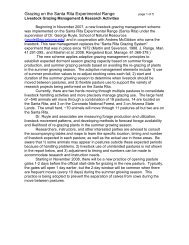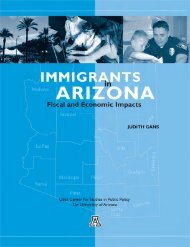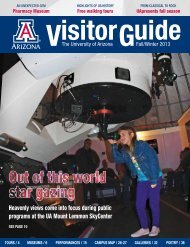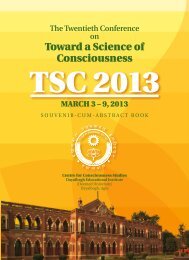CONSCIOUSNESS
Download - Center for Consciousness Studies - University of Arizona
Download - Center for Consciousness Studies - University of Arizona
- No tags were found...
Create successful ePaper yourself
Turn your PDF publications into a flip-book with our unique Google optimized e-Paper software.
3. Cognitive Sciences and Psychology 137<br />
3.11 Cognitive development<br />
3.12 Artificial intelligence & robotics<br />
186 When is a Robot Conscious? Peter Ford Dominey, Stephane Lallee<br />
(Robot Cognition Laboraotry, INSERM Stem Cell and Brain<br />
Research Institute, Bron, France)<br />
In The Conscious Mind (1996) Chalmers argues that a zombie world can exist which is<br />
physically indiscernible from our world, but entirely lacking conscious experience, and that<br />
this leads to a logical inconsistency for physicalist theories of consciousness. Dennett and<br />
others have argued that the strong notion of zombies is not feasible. Today, highly articulated<br />
humanoid robots provide a new testing ground for these notions. In this context, we have developed<br />
cognitive systems that allow humanoid robots to learn to (1) recognize and describe<br />
new actions, (2) observe two humans performing coordinated cooperative tasks and then (3)<br />
step in and participate, taking the role of either observed human. The robot has a shared intentional<br />
plan that allows it to anticipate what the human will do, and help the human when<br />
necessary. Such an ability to manipulate shared intentions is considered a hallmark of human<br />
cognition (e.g. Tomasello et al. 2005). The robot can also describe what it and the others are<br />
doing, and why, and ask questions when it does not understand things. The question can then<br />
be posed, to what degree are these robots conscious? The talk will provide concrete examples<br />
of humanoid robots performing cognitive tasks that are typically considered to require consciousness<br />
in humans, and will address this question of robot consciousness in the context of<br />
current perspectives in philosophy of psychology, and cognitive neuroscience. C5<br />
187 Moving Bubbles of Attention: A Mechanism Enabling the Emergence of Self and<br />
Focused Consciousness in Embodied Artificial General Intelligences Ben Goertzel<br />
(CEO, Novamente LLC and Biomind, Rockville, MD)<br />
A systematic conceptual and technical perspective on machine consciousness is outlined,<br />
and explored in the specific context of the OpenCog Artificial General Intelligence (AGI)<br />
system and its application to control virtual world agents and humanoid robots. Consciousness<br />
is viewed from a panpsychist vantage, as a universally present “ambient” quality which<br />
manifests itself differently in different entities, and which appears in a highly focused form in<br />
certain embodied, self-modeling intelligent systems like humans. The question of how to create<br />
AGI systems that give rise to similar forms of highly focused consciousness is posed; and a<br />
solution is hypothesized, in the form of nonlinear-dynamical attention-allocation mechanisms<br />
that give rise to a spontaneously self-organized “moving bubble of attention” correlated with<br />
the system’s self-model. The specific implementation of this mechanism in the OpenCog system<br />
using artificial economics and probabilistic inference is discussed. Speculations regarding<br />
the potential underpinnings of similar phenomena in human and animal brains are also briefly<br />
considered, including dendritic webs and strange attractors. PL4<br />
188 What Could a Brain do with Quantum Algorithms? Hartmut Neven, Vasil S.<br />
Denchev, Purdue University, Vdenchev@purdue.edu Geordie Rose And William G.<br />
Macready, D-Wave Systems, Rose,wgm@dwavesys.com (Google,<br />
Malibu, CA)<br />
The tradition of the Tucson conferences was in part born out of the idea that quantum<br />
mechanical processes are implicated in conscious experience. Proving this conjecture poses<br />
formidable epistemological and experimental challenges. An aspect that has received less attention<br />
but is more tractable is the question to what degree quantum mechanisms can assist an<br />
intelligent system in performing key tasks. We want to contribute to the debate by reporting on<br />
a series of theoretical and experimental studies designed to show how learning from examples<br />
can benefit from employing quantum algorithms. A formulation is employed in which a binary<br />
classifier is constructed as a thresholded linear superposition of a set of weak classifiers. The<br />
weights in the superposition are optimized in a learning process that strives to minimize the







